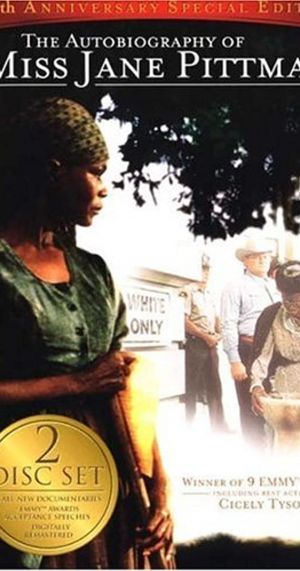The Autobiography of Miss Jane Pittman (1974)
The Autobiography of Miss Jane Pittman was released on January 31, 1974, in the USA. The American film was produced by Tomorrow Entertainment. The film was directed by John Korty. The film is displaying how Miss Jane Pittman, went throughout the slavery era till became an activist of civil rights movement in the 1960s[1].
Plot

Jane was a slave girl on a plantation in Louisiana during the Civil War era. After the Emancipation Proclamation was issued by Abraham Lincoln, Jane was freed and decided to go to Ohio, meeting one of her colleagues that she knew. However, she didn't see him and went looking for a new pathway in her life. She worked as a field hand in one of the ranches owned by white people. As time went by, she married the love of her life, Joe Pittman, a black cowboy. Yet, he died when he tried to rechase one of his horses. She also grieved with the death of her colleague during the journey to Ohio, Ned, who died by bigots as Ned tried to create a black school and teaching political rights. She had gone through lots of prejudice and hardship over the years. After a 100 year journey, she also took part as an activist where she became an example for young black Americans to stand for freedom and equality[3].
Black Empowerment
The film reveals how Jane and her Colleague took part in the civil rights movement. For example, Ned, her colleague during the journey to Ohio, established a school for black Americans where he wanted the black Americans to be educated, literate, and develop a political conscience on equality and civil rights. Ned did not only taught black American kids, but he also designed knowledge for his black neighbors regarding the civil rights movement. Moreover, Jane also helped him by becoming his protection as Ned was confronted by many white segregationists. Jane then became an activist and even took part in the demonstration on the street at the age of 70 by retiring from her job as a house servant. Ultimately, she was the first one to drink water from whites' only fountain that soon became a heroic symbol for black Americans to have freedom and equality just like anybody else[4].
Controversy
The film reveals how slavery was like in the 1800s. Many black Americans were beaten even to death including Jane as a kid. After the Emancipation Proclamation, many black Americans did not have freedom as the "ex-slaves" were hunted by white segregationists and killed when the black Americans were on their trip to look for a new life. Another scene also shows that Ku Klux Klan was looking for many civil rights activists like Ned who they wanted to kill. Still, Ned was murdered by some bigots who wanted to keep the segregation occurrence in the area. Other activists were also killed such as Jimmy Aaron, a savior on a racist plantation, shot dead as he organized the civil rights movement through protest and legal at the courthouse. Despite decades after the Emancipation Proclamation, slavery and prejudice remain to exist and cause many deaths of black Americans who oppose the segregation[5].
References
- ↑ The Autobiography of Miss Jane Pittman (1974). IMDb. Retrieved January 27 2021
- ↑ The Autobiography of Miss Jane Pittman Film Cover. Amazon. Retrieved January 27 2021
- ↑ Frederic and Mary Ann Brussat. The Autobiography of Miss Jane Pittman Spirituality and Practice. Retrieved January 27 2021
- ↑ Scott Holleran. The Autobiography of Miss Jane Pittman TV Guide. Retrieved January 27 2021
- ↑ The Autobiography of Miss Jane Pittman SparkNotes. Retrieved January 27 2021